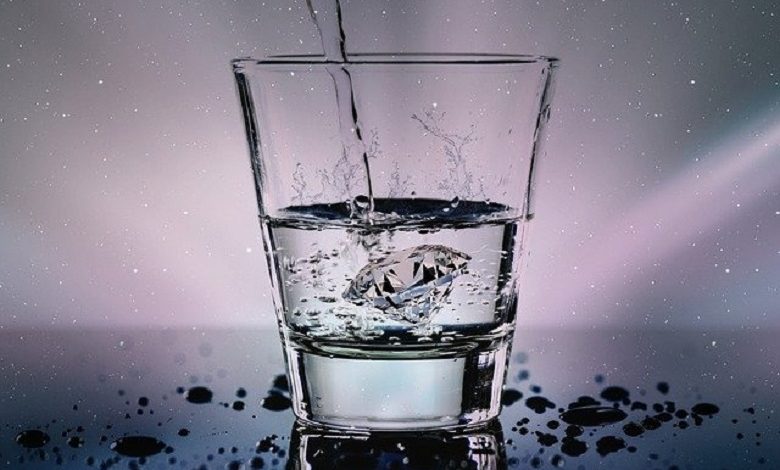6 reasons why you shouldn’t drink water left in a glass overnight

If you’ve ever held a glass of water next to your bed at night, you may have noticed that the water tasted a little odd in the morning.
It may seem to you that the water has lost its freshness, but can it deteriorate?
You don’t think. During the night, in an uncovered glass of water, small chemical changes occur that change the balance of the water.
1. The acidity of the water in the glass changes over time
The fact is that the chemical composition of the water changes overnight, even if by a small percentage. About 0.13% is converted to carbonic acid, which later forms bicarbonates and carbonates. This does not mean that the water is becoming unsafe.
Dissolved gases are one of the reasons for the change in the taste of water. While the water is standing still, a small amount of carbon dioxide dissolves into the water. This forms carbon dioxide, which can lower the pH level slightly and slightly alter the taste of the water.
While this does not affect, this water may not taste perfect.
Over time, small amounts of other gases such as acetone and aldehydes can also dissolve. Studies have shown that it quickly acquires various impurities if you leave clean water even for half an hour.
2. Water left in the open air is exposed to external factors
For example, water left uncovered in a home attracts tiny dust particles.
Mosquitoes, flies, and other small insects also settle on it. When you drink this water in the middle of the night, you may not notice it.
3. Water can taste musty in less than half an hour
Tap water flows through underground pipes, where it is usually cooler. Many of us add ice or drink frozen water.
When the water temperature rises to room temperature, its smell begins to change. The warmer the drink, the faster the water molecules start to bounce off, and the odour intensifies.
Do not forget that tap water contains chlorine, which is added for disinfection. Chlorine is a gas at room temperature and is volatile in water, which means that its molecules are dispersed in the water and eventually evaporate into the air.
This is another reason the water tastes a little odd.
4. Millions of Germs Are Added with Every Sip
Water is the element that is the source of life. If you leave it for a long time, bacteria begin to multiply in it.
Many bacteria live in the human oral cavity since the mouth is a warm and humid environment favorable for their reproduction.
It is believed that there are about 800 to 1000 different types of bacteria in the mouth.
With each sip, the number of microbes in a glass of water multiplies. Even when we drink water from the bottle, debris from skin cells, sweat, and nasal discharge get into it.
These and other factors can cause the number of microbes in the water left overnight to rise to significant levels.
5. Spilled water can cause a short circuit in electronic devices
Many people have a habit of charging phones, watches, and other electronic devices overnight.
When you place a glass of water next to charging electronics and accidentally tip it over in your sleep, it is a potential threat to the electronics.
In some cases, a short circuit may occur, and this will damage your devices.
6. Sleep is disturbed
If you put a glass of water next to you and drink in the middle of the night, then you may feel a frequent urge to urinate.
Getting out of bed like this during the night disrupts your natural sleep cycle, which can make you wake up tired the next day.
Experts recommend giving up water 3 hours before bedtime. During this time, your body will be able to process everything; you will go to the toilet, which will not disturb your sleep.
Where else should you not leave water for a long time?
Do not leave water in the car, especially in the sun, where the water bottle can become hot, making it a breeding ground for bacteria, especially if you have already drunk from it. Placing the bottle under the seat will reduce heat, but bacteria will still grow.
Some types of plastic bottles contain BPA or similar chemicals that can seep into the water, especially when exposed to sunlight.
A number of studies have linked bisphenol A to health problems affecting the brain and human behaviour, although bottled levels are believed to be within safe limits.
Advice:
It is, of course, essential to stay hydrated to stay healthy. However, several rules must be followed:
- It is best to drink a glass of water when you feel the need to, rather than leaving the glass uncovered overnight, and if necessary, keep a bottle of water.
- If you start drinking water from a bottle, finish it up and then discard the bottle.
- Try not to touch the bottle with your mouth. Just pour the water into a glass before drinking or pour it directly into your mouth.
- Don’t drink water that has expired (yes, water has an expiration date).
- Wash the glass from which you drink water, do not use it endlessly.
- Don’t share your glass with others.




